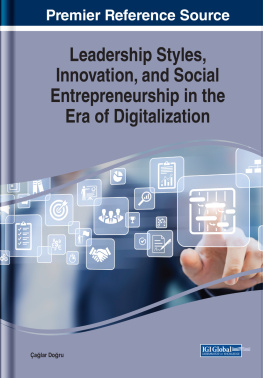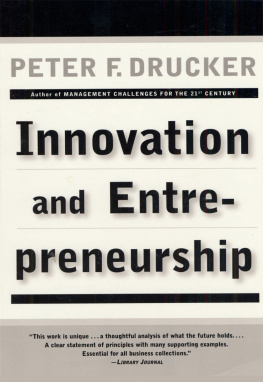Contents
Preface
This book aims to provide you with an understanding of the nature of an enterprise and entrepreneurship. It introduces the role of the entrepreneur, innovation and technology in the entrepreneurial process, and describes and applies management functions. It also examines complexities of entrepreneurial dynamics and the strategic planning process. The book focuses on providing the knowledge and skills in information and technology entrepreneurship and management. It presents and analyzes various topics such as theories of management and the roles managers play in an IT organization, organizational design decisions and leadership styles, innovation stimulation and business plan development, entrepreneur financial management, competitors analysis, marketing strategies and market mix components, taxation, legal aspects and practice.
Expected Outcomes
At the end of this book, you will acquire knowledge, skills and competencies that will enable you to:
Demonstrate an understanding and application of major principles and concepts of management theory and practice in their work.
Identify and analyze various approaches to management and entrepreneurship.
Demonstrate an understanding of the basic elements of a business plan and be able to generate an entrepreneurial idea and develop it into an actual market-ready plan.
Comprehend various business strategies and operational components of a business and apply entrepreneurial knowledge in their place of work and by developing their own businesses, manage them with confidence.
Nature, Evolution and Meaning of Management, Organization and Leadership
Theories of Management and Roles Managers Play in an Organization
Management Evolution
An understanding of modern management can be enlightened by searching the past to see how the process evolved.
The Egyptians and the Sumerians
The case of the pyramids has a fascination over the minds of modern men and women. They were built over a period of a hundred years at Giza in Egypt. The precision and durability with which the pyramids were built was extraordinary considering the fact this was about 4,500 years ago. They were the largest stone structures in the world, containing enough stones to build a wall all the way round a country the size of France.
The reasons behind building the pyramids is of interest to people in management. First, the Pyramid Project was initiated by the Pharaohs as a method of creating an integrated human community, the size of a state. Before, Egyptians had lived in communities no larger than a tribe or village, and they were located far from each other.
Second, the increase in the size of the Egyptian population required a larger scale organization, in order to make optimum use of the Nile river, which was the source of water to irrigate the land on which the food was grown. The 100,000 men that gathered to work on the Pyramid Project had to be housed and fed, and their families they left behind had to be taken care of by the Pharaohs.
Fig: Pyramids of Giza
People in management learn the following from the case of the Pyramid Project:
A Sense of Nationhood because of the common task they were involved in and the commitment they made to it as one people. (Patriotism was born)
A Civil Service Infrastructure (Administration and Bureaucracy) was born to take care of workers and the families they left behind. The workers were also promised rewards in the afterlife. (Similar to todays pension scheme)
Hierarchy organization and coordination of such a large workforce produced a hierarchy of authority as logical means of integrating dispersed effort.
The Pyramid Structure provided the pattern for the nation state , which became successful not only in Egypt but was taken as the pattern for succeeding nations and other large organizations such as armies, local government, and business. It was based on commitment , obedience and sacrifice .
Machiavelli
Niccol di Bernardo dei Machiavelli was a Secretary to the Florentine Republic from 1498 until 1512, when he was dismissed and imprisoned for conspiring to overthrow the Medici Family.
Fig: Niccol di Bernardo dei Machiavelli
He is best known for The Prince , written in 1513. He has often been called the father of modern political philosophy or political science. Our main interest in Machiavellis ideas lie in his analysis of how the Prince (or Leader/Manager) meets his obligations.
For management, the following points from Machiavelli are of interest:
Cohesive Organization : The Prince should maintain the cohesiveness of his organization by binding to him his friends and those on whom he will depend.
Mass Consent: No matter how cohesive the structure of the organization, the Prince has to maintain the consent of the governed, as this is the source of his authority.
Leadership: Cohesive organization and mass consent can only be achieved if the Prince is a leader an example-setter for his people.
Toughness: There will be attempts to unseat the Prince, so he must have the toughness to resist any such attempts and be ruthless with the instigators.
This is how our language borrowed Machiavellian meaning cunning, amoral, and opportunist.
The Industrial Revolution
Slowly the patterns of human evolution began to evolve and the role of the leader was clarified, but then came the watershed of the Industrial Revolution , which was to transform Britain and then the rest of Europe and the United States into industrial nations.
Hitherto the practice of management had been confined to Church, State, and Army; Prince or Officer. The institutions of commerce and industry were born, and traditional leaders of society had no place in them. We acquired a new occupation and a new class the bourgeoisie . Karl Marx claims that the bourgeoisie has created more massive and colossal productive forces than all preceding generations together.
Forces of nature was subjected to man where there was application of both machinery and chemistry to Industry and Agriculture. Steam navigations and railways, electric telegraphs, clearing of whole continents for cultivation, and canalization of rivers evolved.
Fig: The First Industrial Revoltion
What we understand from the Industrial Revolution as people in management are:
Flow of work
Wages
Records
Flow of Work
The job of individual employees were broken down and analyzed to estimate their contributions (the beginning of time and motion study).
Wages
Wage payment arrangements were developed to be consistent with the requirements of each job.
Records
Records were developed for cost accounting. Records enabled the manager to identify areas of inefficiency and those of high productivity.
Managers
A manager is someone who works with and through other people by coordinating their work activities in order to accomplish organizational goals. A manager gets things done through other people. A managers job is not about personal achievement its simply about helping others do their work and achieve.













